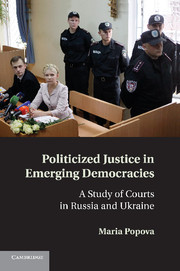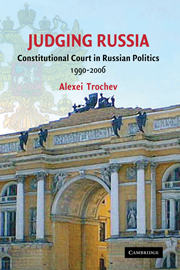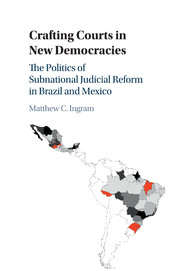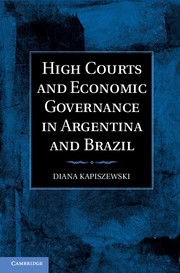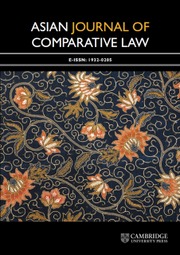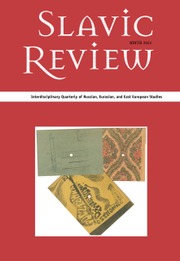Politicized Justice in Emerging Democracies
A Study of Courts in Russia and Ukraine
$49.99 USD
- Author: Maria Popova, McGill University, Montréal
- Date Published: March 2012
- availability: This ISBN is for an eBook version which is distributed on our behalf by a third party.
- format: Adobe eBook Reader
- isbn: 9781139227803
Find out more about Cambridge eBooks
$
49.99 USD
Adobe eBook Reader
Other available formats:
Hardback, Paperback
Looking for an inspection copy?
This title is not currently available on inspection
-
Why are independent courts rarely found in emerging democracies? This book moves beyond familiar obstacles, such as an inhospitable legal legacy and formal institutions that expose judges to political pressure. It proposes a strategic pressure theory, which claims that in emerging democracies, political competition eggs on rather than restrains power-hungry politicians. Incumbents who are losing their grip on power try to use the courts to hang on, which leads to the politicization of justice. The analysis uses four original datasets, containing 1,000 decisions by Russian and Ukrainian lower courts from 1998 to 2004. The main finding is that justice is politicized in both countries, but in the more competitive regime (Ukraine) incumbents leaned more forcefully on the courts and obtained more favorable rulings.
Read more- First book-length comparative study of political factors that influence the behavior of post-Communist lower courts
- Proposes a new quantitative measure of judicial independence that is both more reliable and more directly tied to the rule of law than existing measures
- First book-length systematic analysis of electoral registration disputes and defamation lawsuits against media outlets in the post-Communist region
Awards
- Winner of the 2012–2013 American Association for Ukrainian Studies Book Prize
Reviews & endorsements
'… Politicized Justice in Emerging Democracies is an interesting and noteworthy contribution to the literature on courts in post-Soviet Russia and Ukraine. It demonstrates a masterful combination of various research methods, a coherent and convincing narrative and the courage to study a highly politicised and understudied topic.' Yuliya Zabyelina, Europe-Asia Studies
See more reviews'… Popova achieves much with her clear writing and sharp analysis: her original theory builds upon work of other scholars and is borne out by her detailed study, which challenges the prevailing conception of the relationship between political competition and judicial independence. It also confirms a gap - or more aptly, a chasm - between de jure and de facto judicial independence in these post-Soviet states.' The Cambridge Law Journal
'For comparative judicial scholars, especially those who have had a longstanding focus on the performance of civil rights and liberties in the democratizing world - and more specifically the post-Soviet realm - this is an indispensable book. It challenges readers to think hard about the socio-political context in which institutional reform takes place, warning us against placing too much hope on the ability of the law as a tool to hold political authorities accountable without taking into consideration the limits imposed by the specific reality in which they operate. More importantly, Popova's book makes a significant contribution to the study of judicial independence in comparative perspective. Its clear theoretical framework, meticulous analysis of both qualitative and quantitative data, and thorough discussion of both formal institutions and informal political dynamics, make it mandatory reading in graduate syllabi in the field …' Raul A. Sanchez Urribarri, Global Law Books (www.globallawbooks.org/home.asp)
Customer reviews
Not yet reviewed
Be the first to review
Review was not posted due to profanity
×Product details
- Date Published: March 2012
- format: Adobe eBook Reader
- isbn: 9781139227803
- contains: 8 b/w illus. 14 tables
- availability: This ISBN is for an eBook version which is distributed on our behalf by a third party.
Table of Contents
1. What is judicial independence?
2. Judges and politicians: theories about the origins of judicial independence
3. What can a focused comparison of Russia and Ukraine tell us about the origins of independent court
4. The role of Ukrainian and Russian courts in the provision of free and fair elections: judicial independence from politicians during the 2002 Rada and the 2003 Duma campaigns
5. The role of Ukrainian and Russian courts in the provision of press freedom: judicial independence in defamation lawsuits, 1998–2003
6. Politicians' capacity to pressure the courts
7. Politicians' willingness to pressure the courts, 1998–2004 and beyond.
Sorry, this resource is locked
Please register or sign in to request access. If you are having problems accessing these resources please email [email protected]
Register Sign in» Proceed
You are now leaving the Cambridge University Press website. Your eBook purchase and download will be completed by our partner www.ebooks.com. Please see the permission section of the www.ebooks.com catalogue page for details of the print & copy limits on our eBooks.
Continue ×Are you sure you want to delete your account?
This cannot be undone.
Thank you for your feedback which will help us improve our service.
If you requested a response, we will make sure to get back to you shortly.
×
